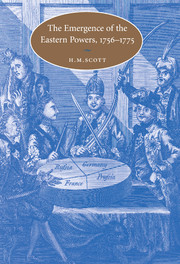Book contents
- Frontmatter
- Contents
- List of maps and genealogical table
- Acknowledgements
- A note on dates and place names
- List of abbreviations
- Introduction: the eighteenth-century European states system and its transformations
- 1 The rise of the eastern powers
- 2 The Seven Years War and the European states system
- 3 The domestic legacies of the Seven Years War
- 4 The stabilisation of Europe, 1763–1766
- 5 Diplomacy and the eastern powers
- 6 From peace to war, 1766–1768
- 7 The partition of Europe, 1768–1772
- 8 The advance of Russia, 1772–1775
- Conclusion: Russia and the emergence of the eastern powers
- Bibliography
- Index
- CAMBRIDGE STUDIES IN EARLY MODERN HISTORY
5 - Diplomacy and the eastern powers
Published online by Cambridge University Press: 16 July 2009
- Frontmatter
- Contents
- List of maps and genealogical table
- Acknowledgements
- A note on dates and place names
- List of abbreviations
- Introduction: the eighteenth-century European states system and its transformations
- 1 The rise of the eastern powers
- 2 The Seven Years War and the European states system
- 3 The domestic legacies of the Seven Years War
- 4 The stabilisation of Europe, 1763–1766
- 5 Diplomacy and the eastern powers
- 6 From peace to war, 1766–1768
- 7 The partition of Europe, 1768–1772
- 8 The advance of Russia, 1772–1775
- Conclusion: Russia and the emergence of the eastern powers
- Bibliography
- Index
- CAMBRIDGE STUDIES IN EARLY MODERN HISTORY
Summary
By the third quarter of the eighteenth century the nature of ancien régime diplomacy was well established. During and immediately after the long personal rule of Louis XIV (1661–1715) the reciprocal exchange of diplomats had become more widespread and a network of resident ambassadors and ministers had spread across southern, western and central Europe, while the customs and practices of modern international relations simultaneously took shape. These decades had given a new formality to the content and conduct of relations between states, with France serving as the model. Ceremonial, protocol, diplomatic instructions and the negotiations actually undertaken: all became more formalised during and immediately after the Sun King's reign. France's contribution to the development of resident diplomacy was apparent in the fact that French became the diplomatic language par excellence of eighteenth-century Europe. Half a century after Louis XIV's death, France's diplomatic service remained pre-eminent. Her ambassadors were more polished and also more subtle, her infrastructure more extensive, her negotiating techniques more advanced than those of other states. Though Austria had been part of the European diplomatic network from the very beginning, the other two eastern powers only joined during the eighteenth century. While Vienna by this period closely resembled the kind of diplomatic society to be found in every major capital, the situations in Berlin and, in a different way, St Petersburg, were distinctive and were important for their states' political rise.
- Type
- Chapter
- Information
- The Emergence of the Eastern Powers, 1756–1775 , pp. 140 - 161Publisher: Cambridge University PressPrint publication year: 2001



